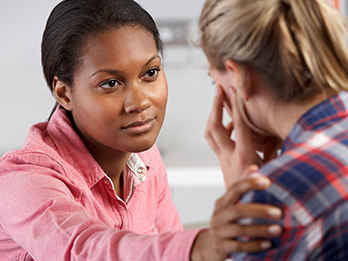Home / Health & Wellness Articles / Family Matters /
How to Support Sexual Trauma Survivors

Every 68 seconds, someone is sexually assaulted. The probability that you know someone who has experienced sexual trauma is high. Individuals who are at particularly high risk of sexual assault include children and young adolescents, elderly people — especially those with dementia — as well as individuals with developmental disabilities. Whether the assault occurred recently or years ago, each person has the right to be heard and supported with treatment interventions.
Recent educational campaigns and public discussions are providing a broader understanding of the damage caused by sexual assault and sexual trauma.
Here are several ways to support survivors of sexual trauma.
Know the Misconceptions
We can stop the spread of false information about sexual assault and trauma by knowing the misconceptions that exist.
First, sexual assault is often more about power and control than only about sex.
Second, sexual assault may be committed by a person who is not a stranger to the victim. According to the Rape, Abuse & Incest National Network (RAINN), in 93% of juvenile sexual abuse cases reported to law enforcement the survivor knew the perpetrator.
Further, sexual trauma can have a profound effect on the life of a child or adult. “Survivors may experience both immediate and continuing effects as they establish and navigate their interpersonal relationships,” says Brittany Haemmerlein, Director of Nursing for Centerstone. There are physical and emotional effects of such trauma, including post-traumatic stress disorder and other anxiety disorders, as well as depression.
Don’t Blame the Victim
Sexual assault thrives on secrecy and blaming the victim or survivor. Statements like, “Why didn’t they run?” or, “They should take sexual defense classes,” may come across as blaming the survivor without a person even realizing it. Phrases like this make it more difficult for an individual who has experienced sexual assault to speak out about their experience. According to RAINN, only 310 out of 1,000 sexual assaults are reported to the police. Encourage appropriate reporting of sexual assault to authorities to whatever degree they are comfortable with.
Provide Support
Support individuals who have endured sexual assault by listening to their narrative and offering to help in whatever way you can. If the incident was recent, seek out medical attention first. Regardless of whether they want to report, they can still receive the medical attention and the forensic exam. This will give them access to treatment for possible STD exposure and can help preserve evidence.
Another important way to support them is to help connect them with advocates and clinical providers who specialize in treating survivors of sexual abuse. An effective treatment referral could incorporate evidence-based practices, including trauma-focused cognitive behavioral therapy and other psychotherapy strategies; some individuals can benefit from psychiatric treatment also targeted to co-occurring conditions like anxiety and depression.
The National Sexual Assault Hotline, 1-800-656-HOPE (4673), is free and confidential. Trained staff members are there 24/7 to listen, support, answer questions and provide resources. At Centerstone, we have professionals trained to provide treatment to rape and sexual abuse survivors of all ages. Our advocates provide unconditional support throughout every stage of the process, including the medical exam, law enforcement report and criminal justice.
Sexual trauma should not ultimately determine an individual’s future life path. With understanding and support, we can begin to ensure no one goes through their healing alone.
If you or someone you know are dealing with mental health challenges due to trauma, Centerstone is here to help. Call us at 1-877-HOPE123 (877-467-3123) for more information about our counseling services.


